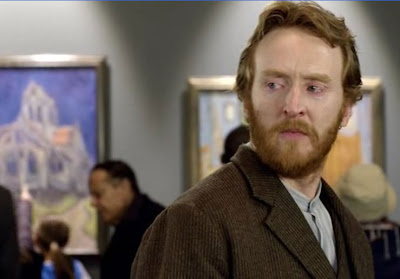I'm with what appears to be the consensus amongst discerning "Doctor Who" fans that this Richard Curtis-written episode let down the side for most of its length, by bringing Vincent Van Throat-Clearning-Noise into the picture and then finding nothing better for him to do than fight yet another last-of-his-race and/or abandoned-far-from-home misunderstood alien -- but that the finale in the museum unexpectedly brings us to our knees and makes it all worthwhile. "Bill Nighy may only have been in the episode briefly," says one fan "but his role leads to the most emotionally charged piece of drama this season of 'Doctor Who' has produced." Curtis doesn't seem as comfortable with SF as Davies and Moffat, but he was willing to tread water in it for a while, working on what is really a fairly low space-opera level, while dropping in glimpses of the painter's suffering (well-portrayed by Tony Curran), and then delivering the coup de grace, using time-travel as a device to slide us sideways into a wonderful piece of wish-fulfillment.
There are also a couple of "Ginge" and bow-tie jokes for those who are truly allergic.
Sunday, June 27, 2010
Subscribe to:
Post Comments (Atom)






1 comment:
The basic wish-fulfillment device (and not a dry eye in the house -- that Curtis sure can jerk those tears) is used in a story by Max Beerbohm from about 1915, which I call to your attention:
An unsuccessful avant garde poet sells his soul to the devil in the 1890s to be able to spend an afternoon at the British Museum Reading Room a hundred years hence, to see if he's vindicated by posterity....
On the actual day in question, of course, the members of the Enoch Soames society showed up there in numbers. They claim to have seen him.
Post a Comment